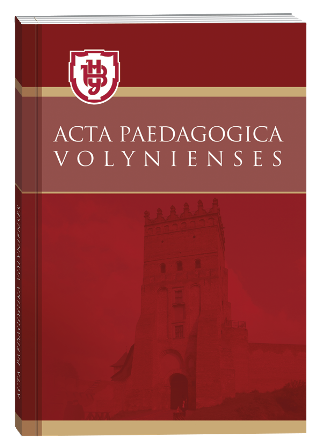DEVELOPMENT OF ENGLISH-LANGUAGE SOCIOCULTURAL COMPETENCE OF MILITARY PERSONNEL IN THE CONTEXT OF SCIENTIFIC AND PEDAGOGICAL RESEARCH
DOI:
https://doi.org/10.32782/apv/2025.2.24Keywords:
sociocultural competence, development of sociocultural competence in higher military education institutions, foreign language sociocultural competence, foreign language sociocultural competence of military personnelAbstract
The article presents a comprehensive analysis of scientific studies dedicated to the development of English-language sociocultural competence among military personnel. The relevance of the topic is determined by NATO standards, which require a high level of foreign language proficiency. This involves not only knowledge of vocabulary and grammar but also the ability to function effectively in a foreign sociocultural environment. The aim of the article is to review and analyze leading scientific sources devoted to the study of the formation of foreign language sociocultural competence among military personnel. The article explores approaches to foreign language teaching that integrate language training with the acquisition of cultural codes, traditions, and behavioral norms of foreign-language communities. Key aspects of sociocultural competence are highlighted, including its structure and role in shaping the communicative ability of military personnel. Special attention is paid to the analysis of academic perspectives by both Ukrainian and international researchers, such as M. Bayram, C. Kramsch, J. Cummins, D. Hymes, Y. Bezvin, S. Nikolaieva, and N. Borysko, who have studied the sociocultural dimension of foreign language education. The article emphasizes the pedagogical conditions for developing sociocultural competence, such as the use of authentic materials, interactive methods, digital technologies, and methodological models that promote the effective acquisition of culturally conditioned language norms. It illustrates the importance of a holistic approach to the language training of military personnel, focused on the development of sociocultural competence as a necessary condition for professional mobility and effective intercultural communication. Although the issues of sociocultural competence, its structure, and the peculiarities of its formation have attracted the attention of many national and foreign scholars, this topic remains underexplored in modern academic literature. In particular, the development of sociocultural competence during foreign language instruction at higher military educational institutions has not yet been sufficiently studied.
References
Безвін, Ю. Г. Формування соціокультурної компетентності майбутніх викладачів іноземних мов у контексті науково-педагогічних досліджень. Наукові записки Національного університету «Острозька академія», 2016. № 61. С. 171–174.
Бориско Н. Ф. Діалог культур: необхідність, можливість і межі. Інноваційні підходи до навчання іноземних мов та культур у новому тисячолітті: зб. тез доповідей міжнародної практичної конференції. Дніпропетровськ, 2002. С. 12–13.
Єфімова О.М. Формування іншомовної комунікативної компетентності курсантів під час оволодіння фахом у вищих військових навчальних закладах. Вісник Національного технічного університету «Київський політехнічний інститут». Серія: Філологія. Педагогіка: Зб. наук. праць. Київ, 2013. № 1. С. 95–105.
Загальноєвропейські Рекомендації з мовної освіти: вивчення, викладання, оцінювання / Науковий редактор українського видання доктор пед. наук, проф. С. Ю. Ніколаєва. К. : Ленвіт, 2003.273 с.
Киливник В. В. Формування соціокультурної компетентності майбутніх учителів іноземної мови в системі педагогічного коледжу : дис. ... канд. пед. наук : 015. Вінниця, 2019. 290 с.
Колодько Т. М. Формування соціокультурної компетенції майбутніх учителів іноземних у вищих педагогічних навчальних закладах : дис. ... канд. пед. наук : 13.00.04. Київ, 2005. 185 с.
Лагодинський О.С. Військова лінгводидактика як наука. Вісник Глухівського національного педагогічного університету імені О.П. Довженка. – № 38. – 2018. – с. 73 -80.
Лозинський П. І. Проблеми підвищення професійної комунікативної компетентності майбутнього офіцера. Наукові записки Національного університету «Острозька академія» № 52, 2015. С. 160–162
Максимець М. Формування соціокультурної компетенції у процесі вивчення іноземної мови. Вісник Львівського університету. Серія педагогічна. 2006. Випуск 21. С. 211–218.
Мамонова І. П. Формування соціокультурних компетенцій учнів через використання автентичного матеріалу. Англійська мова та література. 2011. № 19–21. С. 9–10.
Стандарт НАТО щодо мовної підготовки військовослужбовців STANAG 6001 Рівні мовленнєвої компетентності URL: https://nuou.org.ua/assets/documents/dodb_stanag_6001.pdf
Сулік О. А. Методика формування соціокультурної компетентності в умовах багатомовного навчання в загальноосвітній школі : дисертація на здобуття ступеня доктора філософії. Кривий Ріг, 2023. 307 с.
Kramsch, C. (2014) Language and Culture. AILA Review. № 27. Р. 30–55.
Neuner, G. (2003). Socio-cultural interim worlds in foreign language teaching and learning . Intercultural competence, 15–62.
Byram, M. (2020). Teaching and assessing intercultural communicative competence . Multilingual Matters.







